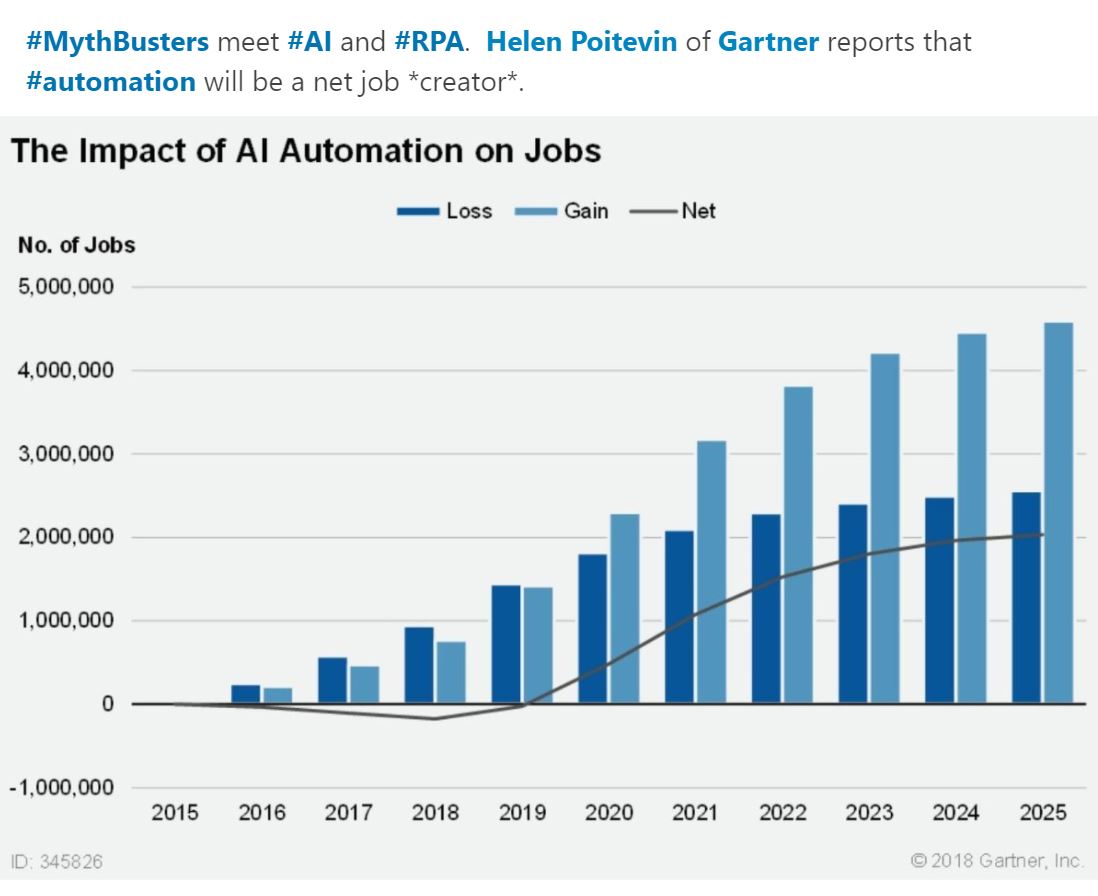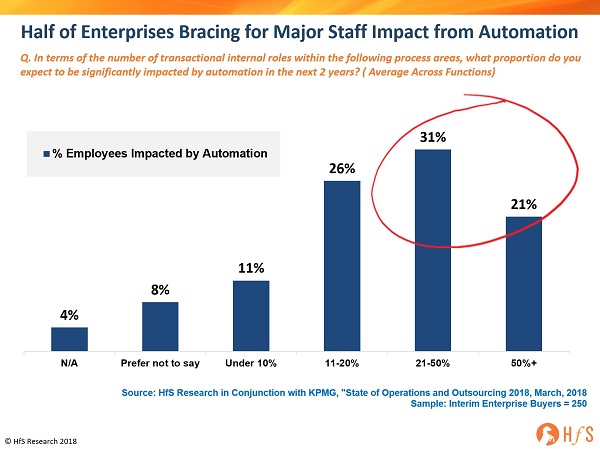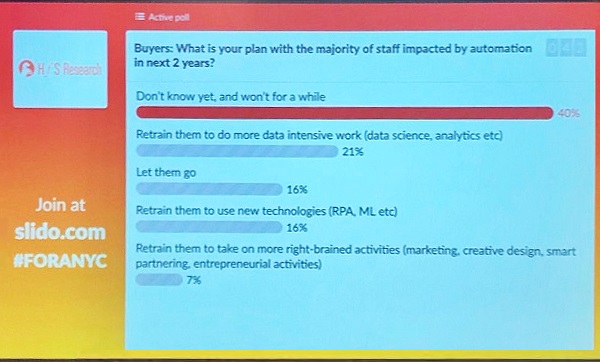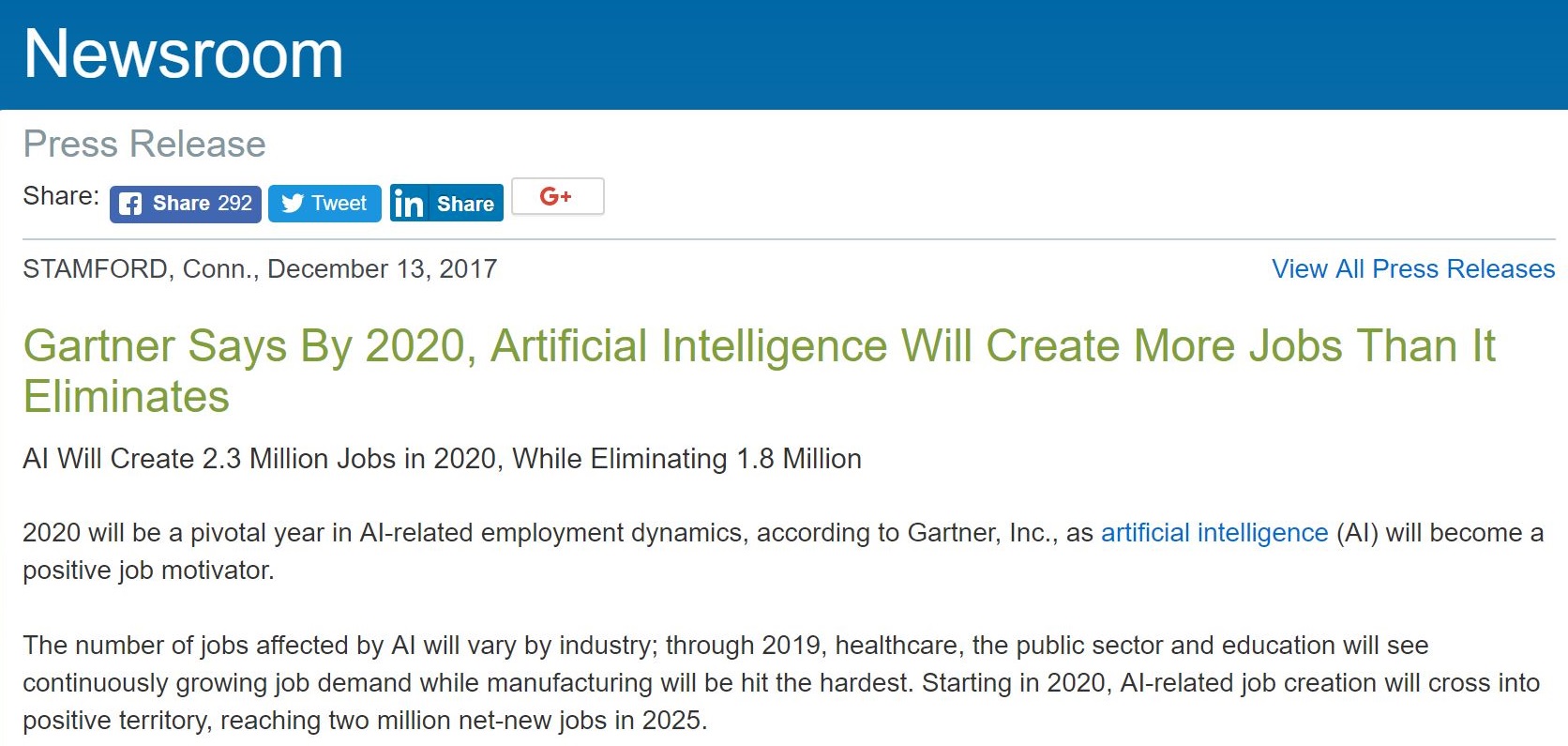Whiplash alert: You may have noticed how Gartner recently flipped its core messaging from automation/AI being a seismic job destroyer to being now a job-creator. And both times, they just can’t seem to back up the rhetoric with actual facts. Plus, they don’t even seem to be able to define consistently what they actually mean by “AI Automation”.
Remember when Gartner claimed that automation and AI were not only going to replace a third of jobs by 2025, but many of us would be reporting to a robo-boss at some stage this year? Well, guess what folks, they’ve now performed a complete 180-degree flip, claiming that millions of new jobs will be created after 2020, far outweighing their previously predicted gargantuan job losses (courtesy of LinkedIn). Wow:

Let’s dare to look back in time to hold Gartner to account
Peter Sondergaard, Gartner’s Head of Research, predicted one in three jobs will be converted to software, robots and smart machines by 2025. Yes he actually said that at his own Symposium, and even added, “New digital businesses require less labor; machines will make sense of data faster than humans can.” However, unlike the good old days when analysts could get away with all flavors of outlandish grandstanding soundbites to spice up a conference, these predictions tend to hang around the internet these days. While many people love to keep spinning new headlines everyday, in the hope #fakenews is now the #realnews, some of us still have memory banks that last longer than one week, especially when CIOs spend billions of dollars for this type of council.
And then who can forget this almighty whopper from Fran Karamouzis, a vice president and distinguished analyst at Gartner:
By 2018, more than three million workers globally will be supervised by “robo-bosses”. Excellent, so Fran’s surely keeping her fingers crossed that the robo-boss takeover is even more imminent than Donald Trump’s interview with Robert Mueller…
Gartner’s new claim why AI and Automation will create this massive net gain in jobs
When Gartner put out this far more positive news, I was so excited, and couldn’t wait to hear their new rationale:
Click to read full press release
“Many significant innovations in the past have been associated with a transition period of temporary job loss, followed by recovery, then business transformation and AI will likely follow this route,” said Svetlana Sicular, research vice president at Gartner. AI will improve the productivity of many jobs, eliminating millions of middle- and low-level positions, but also creating millions more new positions of highly skilled, management and even the entry-level and low-skilled variety.
Great! So there it is. Svetlana goes on:
“Unfortunately, most calamitous warnings of job losses confuse AI with automation — that overshadows the greatest AI benefit — AI augmentation — a combination of human and artificial intelligence, where both complement each other.”
Right, so all the stuff you colleagues were declaring is now calamitous and confusing? Oh, they are talking about “automation” and you are talking about “AI”. So why, Svetlana, do you call your new data forecast “The Impact of AI Automation on Jobs”. Surely you mean “AI Augmentation“. I’m sorry, but I am even more confused that I was before…
When we get into the reasons why automation and AI suddenly have become job creators, I give Gartner some credit for actually trying to give this claim some credence, but then they fail to provide a single real example of how this “new work” is being created:
Craig Roth: research vice president at Gartner: “Companies are just beginning to seize the opportunity to improve nonroutine work through AI by applying it to general-purpose tools. Once knowledge workers incorporate AI into their work processes as a virtual secretary or intern, robo-employees will become a competitive necessity.”
OK – so how will new jobs get created? Sounds like AI is helping knowledge staff cut back on interns here! Gartner continues…
Leveraging technologies such as AI and robotics, retailers will use intelligent process automation to identify, optimize and automate labor-intensive and repetitive activities that are currently performed by humans, reducing labor costs through efficiency from headquarters to distribution centers and stores. Many retailers are already expanding technology use to improve the in-store check-out process.
Great – so retailers are able to use intelligent process automation (whatever that is, I thought we were talking about AI augmentation) to fire humans. They just laid that our pretty plain and simple. No jobs created there then…
“Retailers will be able to make labor savings by eliminating highly repetitive and transactional jobs, but will need to reinvest some of those savings into training associates who can enhance the customer experience,” said Robert Hetu, research director at Gartner.
So some of the savings from sacking transaction staff will be reinvested in more customer aligned people. But that tells me less people will be reemployed, not more. Where is the net gain here?
And Robert goes even further: “While many industries will receive growing business value from AI, manufacturing is one that will receive a massive share of the business value opportunity. Automation will lead to cost savings, while the removal of friction in value chains will increase revenue further, for example, in the optimization of supply chains and go-to-market activities.”
So automation will save them money and make them richer because they will function better. But why will this cause them to hire more people? Where is this assumption coming from that those companies who make higher profits through automation will reinvest in people? Again, there is zero evidence here of a net gain in hiring… c’mon!
And to cap off this wonderful analysis, here’s the pièce de résistance:
“AI can take on repetitive and mundane tasks, freeing up humans for other activities, but the symbiosis of humans with AI will be more nuanced and will require reinvestment and reinvention instead of simply automating existing practices,” said Mike Rollings, (another research vice president at Gartner).
Great, so Mike finally mentions that money will be spent on the reinvention of new processes, as we see these wonderful new nuances of humans and machines come together. Cool… tell me more:
“Rather than have a machine replicating the steps that a human performs to reach a particular judgment, the entire decision process can be refactored to use the relative strengths and weaknesses of both machine and human to maximize value generation and redistribute decision making to increase agility.”
Awesome, Mike. So we’re talking about optimizing the best qualities of both human and machine. I love it, and completely agree with Mike. So maybe we can have an example of this in reality… and maybe even a decent explanation of what really inspired Svetlana to forecast these millions of new jobs that are going to be created? Just one example? Please… pretty please?
The reality: half of firms’ staff will be impacted by automation and 40% of them have no idea what to do with them
So here’s the biggest issue facing enterprise operations in the next couple of years: what to do with staff impacted by automation. Our brand new 2018 State of Operations study, conducted with KPMG, over half the Global 2000 firms surveyed believe transactional roles will be significantly impacted by automation within just a two-year timeframe:

So we thought we’d poll the 120 enterprise buyers at the HfS New York FORA summit last month, and we asked them what they intended to do with their impacted staff:

While a good portion are already thinking about “retraining” their impacted staff to take on analytics work (21%) and help manage new tech such as RPA and ML (16%), the vast majority (40%) are just honest and reveal they just don’t know.
Bottom-line: Please let’s stop trying to confuse everyone. As analysts, we have a responsibility to speak from real facts and real evidence
The technology industry has thrived on the hype for decades, but in the past, it was usually based on established technologies and their real impact on business, proven through many client experiences and tested through time to help us all understand the ultimate impact on business models. Suddenly, many leading experts are making judgments based on possibilities, not realities. The tech suppliers love the hype because it convinces clients to invest, but the more confusing this all becomes, the more dangerous this hype becomes in turning off smart C-Suite executives who need to see real results before making real investments.
Careers are on the line with automation and AI, and the more embedded these technologies become in organizations, the more clients need real data and real evidence to create their roadmap for them. Outlandish claims like this are getting shot down faster than ever, and we need, as an industry, to stop pandering to the marketeers and panic-mongers and start having a realistic conversation.
Posted in : Cognitive Computing, intelligent-automation, Robotic Process Automation








True. The new report is constantly confusing between AI and RPA. Also ML is missed altogether. I didn’t read the full report though just the excerpts from your article. For example this section is confusing:
“AI can take on repetitive and mundane tasks, freeing up humans for other activities, but the symbiosis of humans with AI will be more nuanced and will require reinvestment and reinvention instead of simply automating existing practices,” said Mike Rollins
When did they last get it right!!?
Phil is back to his best!
Thanks for calling this – the #fakenews is reaching critical levels of annoyance
Phil, as a current upstart analyst and former legacy firm analyst, you must be containing a chuckle when elucidating the phrase “As analysts, we have a responsibility to speak from real facts and real evidence.” Many analyst and pundit public pontifications are often skewed (sometimes highly) towards the position and opinion of vested interests. Or lack of a full understanding of market dynamics and realities.
@Stan – yep – I will admit I was stifling a giggle myself when I wrote that, but it’s one thing to pontificate (and we all do that occasionally), entirely another when you start putting out forecasts based on nothing but a hunch… or pandering to vendors who are desperate to downplay the impact of automation and AI and need analysts to toot the marketing horn…
I just wish we’d all challenge each other more. Like we used to… people are far too scared these days to call out the bullsh*t whhen they see it
PF
Yes, too many analysts – and service providers/vendors – today view bullsh*t as just another form of organic fertilizer.
Nothing can beat decent research based upon which it is quite appropriate to draw hypotheses about a future, in which there is uncertainty on both outcome and speed of adoption. It is unhelpful if those asserting expertise simply add to hyperbole and as asserted here flipflop – which in turn generates public confusion and or tabloid stories which create fake news.
There – thats off my chest.
Well written diatribe.
It is a joke what’s going on. Actually across the whole space. The fundamentals are all sand. No actual details, no proof nor even real adoption at scale. It’s causing me a great deal of heartburn to be honest.
I saw Guy Kirkwood’s post on LinkedIn (UIPath marketing and a good guy) and wrote a response that said something like: Henry Ford just turned over in his grave.
But that seemed unuseful, so I wrote it to say something like: this analyst’s net forecast unrealistically eliminates all the top 10 ITO firms employees at least twice over. It doesnt make sense. But then I read the Gartner analyst’s bio, and Helen spent most of her career in a HR reporting team at SAP before going to Gartner 4 years ago. I looked published work on Gartner’s site, and saw she pretty much covers HCM software 90-95% of the time but also penned that really questionable ”Robobosses research” piece in Jan 2017. She did a bit more rehashing of NLP and AI for HR.
She’s not the Gartner analyst I’d call if I wanted a jobs forecast or if I was Gartner selecting a backsliding reversal of everything else the firm has published on the topic as Phil’s dissection above points out. Frankly, Gartner could do a better job managing their research quality and consistency… or so I thought.
Then I didn’t publish my post, because it’s not a positive thing to say on social media AND because Helen’s research assumptions are not published. Maybe there’s something there?
So, It did make me stop and consider automation. Henry Ford’s assembly line invention certainly didn’t kill all the jobs in the automotive industry. Even Tesla’s robotic lines haven’t done it. This industry has boomed over the last 100 years. And similar software automation over the last 20-30 years in Finance and HR (HCM and ERP apps) haven’t killed accounting and HR professions. Lots of people work at SAP, Oracle, Workday, ADP.
You know what’s happening? Investors are harvesting their profits and reallocating capital. We humans workers on payrolls are nothing more than investments made by shareholders.
So, I do believe that jobs will grow. Not just due to population growth and developing countries joining the economy, but because investors will shift their funds to other areas that will be more efficient with AI, ML, cognitive, automation, etc. You can see that occur with stock market trading that has moved to almost entirely electronic, automated methods.
My bottom-line: a ton of jobs are going to be lost. And industries will shift their investments to other places. I’m not sure that’s a net job gain or loss, but it’s gonna be surely a helluva ride….
The change in Gartner’s “vision” illustrates that #AI and #Automation are still very conceptual at this stage : indisputable success is still hard to find!
Until this happens, it is a jungle out there, between… #Automation Service Providers that fire on all cylinders claiming that they hold the truth (many of these will not even exist in 5 years from now, or will not be independent any longer), Consulting / Advisory organisations that try to find a story to tell, BPO Service Providers that, like the “Gaulois” (the French ancestors) wait in fear that the sky will fall upon them and, last but not least, potential Clients that, as a result of all of this, wait before engaging into large-scale projects… (who can blame them?).
Nobody denies the fact that #AI and #Automation will shape form rapidly and will no doubt impact jobs heavily medium term. But … they will most probably not be the “silver bullet”. Realistically, #AI and #Automation will be another toolset that companies will use to increase their productivity and their efficiency.
Short term, do not stop working on your ERP Optimization and Process Transformation programs, since you will need these anyway to take the best out of your future #AI and #Automation initiatives.
Thanks Phil Fersht for bringing an attention to this.
I think as an industry at this point in time we have no idea supported by facts about what our job market will look like in 5 years. At best we can outline a few scenarios and speculate on how they affect our jobs.
Pavel
“Prediction is very difficult, especially if it’s about the future.” –Nils Bohr
When we
1. Goto fast food drive through and its 100% AI
2. Goto big grocery and see Ai robots stocking all shelves and no humsn workers
3. Checkin to plane hotel rental car 100% Human free
We know Gartners going to dust off heir first report!
Love it Phil! Well said
If i may, they haven’t changed their minds. They are changing their prediction which, by definition, can’t be right. If one goes through the article he/she will see that not only nobody knows but on the top of it the AI/automation is all mixed up. In other words, Gartner wants to create the buzz, at the expense of credibility.
I’d be very interested to see Gartner’s response to this. Aside from the obvious vested interests I’d be keen to understand why they are saying it. They have one of the deepest views into corporate IT decision making, I’d love to know what lies beyond their press release. Is it just hype or not?
Nobody really knows this but previous Industrial Revolutions have created jobs but sometimes decades later. No Alibaba or Amazon without the internet but they also needed electricity which was a century old by then. Nobody knows the future, we can only predict it. I predict many jobs will be lost to automation but many will be created in new industries some not even considered yet. Everyone should watch “Do you trust this computer” and make your own mind up.
Couldn’t agree more. Never was a fan of Gartner to start with as their pay-for-play is a bit too obvious, their magic quadrants are indeed mythical, their data is suspect and I compare their predicts to the research equivalent of toilet paper;-)
Really measured and balance critique, Phil. Plus you supplemented it with your own data and realistic contect.
Well done!
This crystal ball gazing needs to stop. This is not a standalone incident. If you will pick up all such statements, 95% times they would be wrong. The remaining 5% would be directionally right but there also the magnitude of impact would be drastically different than what was predicted.
The net “digital” jobs are going to be negative…gut instinct
The conversation needs to be how many HUMAN to HUMAN jobs are created? How are businesses going to push employees closer to the customer? How do we create more meaningful work for people?
Everyone is going to be a Kardashian if we are not careful…snorting condoms and eating pods to get a million views…is that the future we want to leave our kids?
Unfortunately, most of these employees will eventually leave. It’s too hard to develop an individualized career plan. The objective savings often prove to be too seductive for most companies, which are concerned with showing results quarter to quarter.
I worry about our workforce. In a perfect world, we’d be proactively working towards this new paradigm and preparing our society – and individuals – for the changes ahead.
I’ve seen analyst reports that are skewed towards the position and opinion of vested interests (or whoever is paying) instead of backing up their claim with credible data. Per usual, glad Phil Fersht calls out the BS.
Gartner should correctly label themselves a “Global event management company supported by furious report generation” : 🙂
As we have consistently said at Swamys Perspectives, there is NO evidence that:
1.AI and machine learning will destroy hundreds of millions of jobs
2. AI and machine learning will create hundreds of millions of jobs
3. AI and machine learning will create a quantum leap in productivity
Yes, it’s becoming a lot easier to deploy AI and ML algorithms in focused analytics related areas but anything beyond that is pure speculation
Indeed with all this hype, we could all be even looking at the “Consulting scam of the Millenium” 🙂
Thank god you wrote this Phil! You’ve expressed what so many people are thinking,
Ramesh
So much contradictory information in this predictive space. Difficult to know what to be guided by.
Sorry, Phil, but I’m happy that Gartner is spewing this Bullsh*t! What better job security for we HfS readers?
Dear Phil
I spent three years looking at the evidence on automation and the future of work and you are quite right to call this one out. Gartner’s predictions both the original and the new do not come close to being well informed. Unfortunately it is not the only poor piece of ‘analysis’ out there on emerging technologies and their impacts.
My own in-depth review and conclusions are in the new book by Mary Lacity and myself – Robotic Process and Cognitive Automation: The Next Phase (www.sbpublishing.org). See chapter 9. The subject really is a lot more complex and nuanced than headline makers and ‘futurists’ would like us to believe. But as an academic it is always very difficult to outgun the marketing!
best
Leslie (Willcocks)
Thanks for this, it’s a shame than within industry we rely on gossip and hype instead of facts.
Let’s face it – AI is a nice CONCEPT, but nobody’s generating recurring revenue off it in a manner that could be codified and transferred onto other businesses / industries. People don’t know what they mean by AI, and they certainly have no clue how to benefit out of it. The concept that you can run it as a project and then it will enter ‘run’ phase is against the very definition of AI.
As numerous business decisions and investments are made each day based on “Insights” & data backed “Predictions” by the likes of #Gartner, I believe they have an obligation to clear up the air to stay relevant /credible.
I chuckled but also grimaced when I read your “Gartner whiplash” article re: AI’s impact on jobs. Over the years working closely with the firm, I noted two traits about Gartner’s research projections:
(1) They almost always lack grounding in today’s IT reality and are therefore often fantastical. Some have been so out-there, so futuristic (in a bad way) that the projections defeat themselves — like 1950s science fiction (“We’ll be living on Mars by 2000!”). I challenged several researchers regarding the basis of their projections — including doing my own research on their topic — but to no avail.
(2) The authors, almost universally, have never worked in an IT environment — not as a programmer, manager, procurer or other. A lack of real-life IT environment experience and an understanding the “mind of IT” directly impact if not cause (1) above.
So, I’m glad you called them on it. Thank you, from a kind reader.
My firm, DigiBlu, helps organisations create and operate Digital Workforces. We do it at scale and it’s not confusing; it releases many hours of FTE. Mostly the firms reduce overtime, cut back on contractors and maybe freeze hiring – and there is always demand elsewhere to be filled because everyone was already overworked. I’m a big believer in ‘workforces of the future’ and the creation of value-adding roles that play to human strengths, and seek to catalyse such changes, but I am seeing little of it in practice. The analyst reports confuse the hell out of me. When we started out in RPA a couple of years back I believed them, and shame, our website – which needs updating – still reflects their prophesies. Now I know better, which is we still don’t know, but at least doing it on the ground makes us one-eyed kings in a kingdom of the blind!